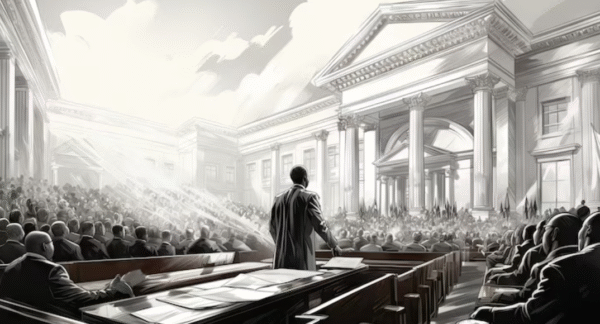Homebuyers’ Victory: Supreme Court Quashes Builder’s Defamation Claim


Introduction
The Supreme Court of India in its ruling safeguarding the rights of consumers and reinforcing the constitutional guarantee of free speechhas quashed a criminal defamation complaint filed by a real estate developer against a group of protesting homebuyers. The judgment, delivered by Justices K.V. Viswanathan and N. Kotiswar Singh in Shahed Kamal & Ors. v. M/s A. Surti Developers Pvt. Ltd. &Anr.,[1] holds that peaceful protests by consumers highlighting legitimate grievances do not constitute criminal defamation.
Table of Contents
Background of the Case
The dispute originated when homebuyers residing in a residential complex developed by M/s A. Surti Developers erected a banner protesting various unaddressed issues in the building such as poor lift maintenance, water supply issues, leakage, plumbing defects, and non-formation of a housing society. The banner was placed in public view and stated in both English and Hindi:
“We protest against the builder A. Surti Developers Pvt. Ltd. for not forming the society even after 18 months… poor lift maintenance… ignoring grievances… We protest for our rights.”
The developer responded by filing a criminal complaint for defamation under Section 500 read with Section 34 of the Indian Penal Code, alleging that the banner was defamatory and damaged its reputation. The Metropolitan Magistrate Court, Borivali, Mumbai, issued summons against the homebuyers. The homebuyers’ efforts to get the complaint quashed were unsuccessful at both the Sessions Court and the High Court levels, prompting them to approach the Supreme Court.
Supreme Court’s Observations
The Court’s ruling comprehensively analyzed the legal framework under Section 499 IPC, specifically focusing on the 9th Exception, which states that an imputation is not defamation if made in good faith for the protection of one’s own or public interest.
Key highlights from the judgment:
- No Use of Foul Language:The Court noted that the language used in the banner was mild, temperate, and factual. There were no abusive or defamatory words like “fraud” or “cheating” and the protest fell squarely within the Ninth Exception to Section 499 of the IPC, which states that it is not defamation to make an imputation on another’s character if done in good faith for protecting one’s own interests or those of others. The Court carefully distinguished this from the First Exception, noting that while truth is an essential ingredient of the First Exception, it is not so in the case of the Ninth Exception.
- Right to Protest: Referring to prior judgments including Anita Thakur v. State of J&K and Javed Ahmad Hajam v. State of Maharashtra[2], the Court reiterated that peaceful protest is a constitutionally protected right under Articles 19(1)(a), 19(1)(b), and 19(1)(c)of theConstitution of India, which guarantee freedom of speech, the right to assemble peacefully, and the right to form associations.
- Grievances in Good Faith: The Court concluded that the grievances aired by the residents were legitimate and had been raised previously in letters to the developer. The banner was an expression of dissatisfaction, not malice.This principle builds on the Court’s earlier jurisprudence, as established in Tata Press Ltd. v. Mahanagar Telephone Nigam Ltd.[3], which held that commercial speech is protected under Article 19(1)(a) of the Constitution, subject to reasonable restrictions under Article 19(2).The judgment also cited Subramanian Swamy v. Union of India[4], where the Court held that the freedom of speech and expression is a highly treasured value under the Constitution and voice of dissent or disagreement has to be respected and regarded and not to be scuttled as unpalatable criticism.
- Chilling Effect of Criminal Prosecution: The Court warned that sanctioning such criminal complaints would create a “chilling effect” on free speech and deter rightful dissent by consumers.
- Business Relationship Context: The judgment emphasized the unique dynamic of a builder-buyer relationship, where raising issues like service defects, infrastructure shortcomings, or administrative delays must be permissible without fear of criminal liability.
Implications of the Ruling
This decision sets a powerful precedent for consumer rights in India, especially in the real estate sector, where delays and deficiencies often lead to prolonged legal battles. The Court’s ruling affirms that:
- Consumers have the right to publicly highlight their grievances, provided they do so truthfully and respectfully.
- Businesses cannot silence dissent through criminal defamation proceedings unless clear malice and falsehood are demonstrated.
Conclusion
The Supreme Court’s judgment is a resounding endorsement of the right to peaceful protest and a critical check against the misuse of criminal defamation laws to suppress consumer voices. By quashing the complaint against the homebuyers, the Court has reinforced that democracy thrives when citizens can speak up especially when it is in pursuit of their rights.
“A right to protest peacefully without falling foul of the law is a corresponding right, which the consumers ought to possess just as the seller enjoys his right to commercial speech,” the Court observed.
This landmark decision will likely resonate across similar disputes and reinforce the balance between freedom of expression and protection of reputation in India’s legal landscape. For more details, write to us at: contact@indialaw.in
[1]2025 INSC 502
[2](2016) 15 SCC 525
[3](1995) 5 SCC 139
[4](2016) 7 SCC 221





Leave a Reply
You must be logged in to post a comment.